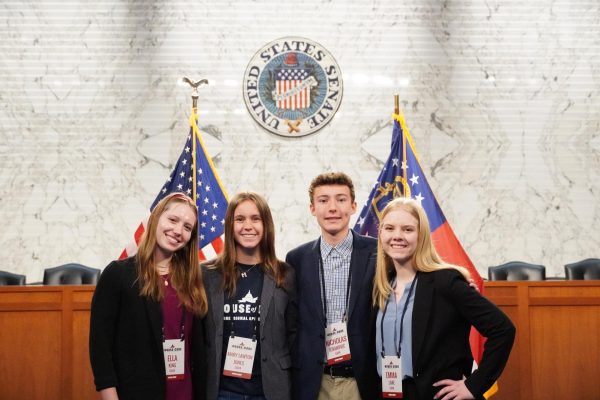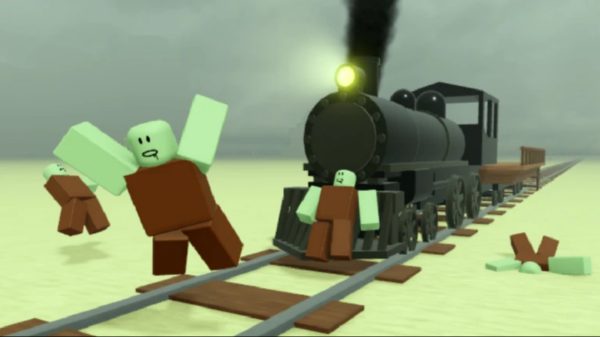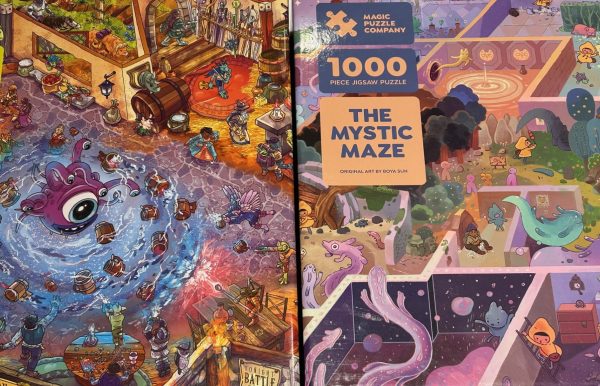Picking Chamblee Students’ Brains About Brain Games
It is safe to say that when Chamblee students have access to technology during class, they use it. While it seems like students may just be distracted, a number of them are playing brain games and puzzles.
“I like playing [brain] games during school because I feel like it takes my mind off a lot of the stress sometimes and it is really fun,” said Abby Millner (‘24).
Recently, brain games have gained more popularity because of a new, in-demand game called Wordle. In this game, the player enters and rearranges letters until they guess the word, which is different each day.
“Wordle really makes me think and it’s a really competitive thing between me and my friends [of] who can get the word first. It starts my brain up for the school day because I normally do it in the morning,” said Millner.
This game, in particular, positively impacts students by allowing them an easy opportunity to be social.
“I like playing Wordle because it helps me make connections with other people because everyone’s playing it now. It’s also a good conversation starter,” said Sophia Wang (‘24).
Because this game supplies different words everyday, eventually it expands students’ vocabulary.
“[Wordle] expands my vocabulary. It helps [students] think together, but it’s still fun. It’s a group game, but it’s still individual. You don’t want anyone else to help you,” said Trinity Walls (’24).
Similar to Wordle, the game solitaire provides students with a fun way to challenge their brains, but it is more individual in nature. In solitaire, you sort through a deck of cards and place them in foundation piles while having to keep them in ascending order.
“I get bored during class, and I think [solitaire] makes me a bit smarter because it’s solving puzzles,” Francesco Lopez (‘23).
Solitaire can also be soothing for some people since it is easy to play and less competitive than other games.
“I think solitaire impacts me because I play it when I’m really stressed and it gets my mind off of stuff. I am able to talk about it with my friends who also play solitaire,” said Millner. “Games like this require arranging and grouping give players exposure to numbers and strategy.”
The ultimate strategy game, chess, also has an electronic version. Chess is played frequently at Chamblee, especially by members of the Chamblee Chess Club.
“I probably play 20 games a day across maybe five classes. It is very productive and it helps me clear my mind. It’s almost therapeutic to me, I guess,” said Garrett Moore (‘23).
For others, playing chess during class is just a competitive way to keep their brain active.
“Chess, it’s really entertaining. […] And it also helps improve your strategy and logic and critical thinking skills, which are all really important for your future,” said Wang.
A certain few Chamblee students have let these brain games impact their life outside of class.
“I’m actually in the chess club now, and I’ve made a lot of new friends through that. So yeah, that’s pretty cool,” said Moore.
Finally, crossword puzzles are another popular brain game many Chamblee students work on in school.
“Crossword puzzles keep my mind going and it takes a lot of time to do them. I have to think and it’s something that takes the stress and my mind off of school,” said Millner.
As well as a stress reliever, crossword puzzles also prepare the brain for class.
“It’s something fun to do when you’re bored in class, and it’s a good thing to do rather than a game because [it] gets your brain thinking,” said Will Johnson (‘22).
There are multiple platforms students do these crossword puzzles on, such as USA Today and the New York Times. These notable websites create and host these word games, which make students think and expand their intelligence.
“I think that [crossword puzzles] help expand your vocabulary. I also think that they improve problem solving skills and they can come in a variety of themes, so you can choose one that you like to make it interesting.”
Overall, these fun brain games have positive impacts on many Chamblee students and affect classes on a day-to-day basis.
“I feel like these puzzles help my critical thinking and make me smarter,” said Joshi.
Your donation will support the student journalists of Chamblee High School Blue & Gold. Your contribution will allow us to print editions of our work and cover our annual website hosting costs. Currently, we are working to fund a Halloween satire edition.

Sarah Marcus (‘24) is a senior and Staff Writer at the Blue and Gold. In five years, she hopes to be out of college, traveling, and exploring the world. Her three favorite things are being outside, adventure activities of any sort, and dance parties.










